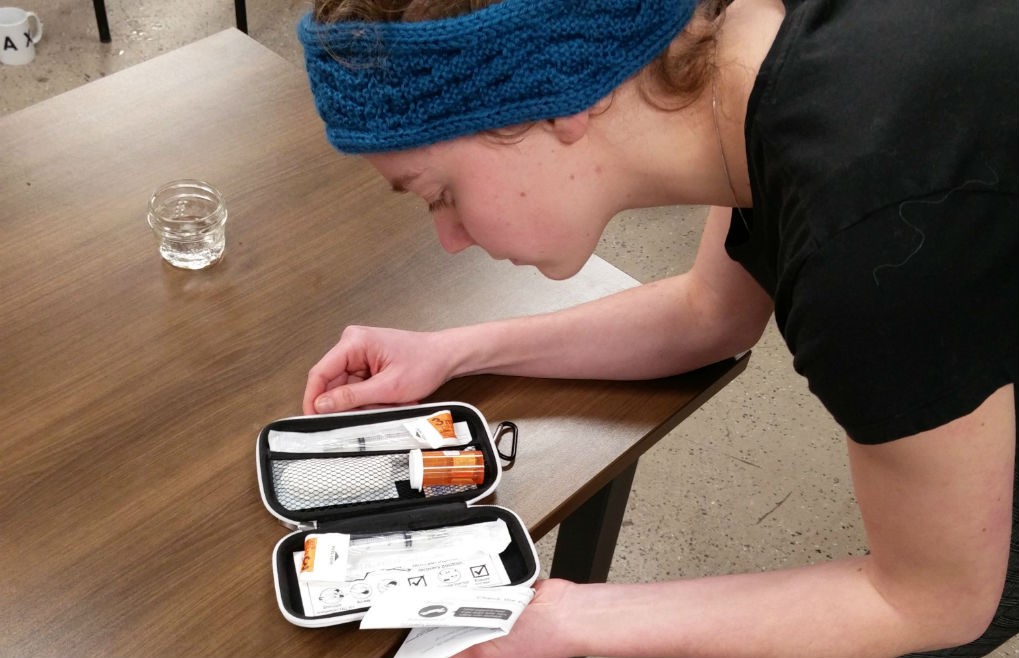Ottawa activist groups offer life-saving naloxone training sessions
By Justin Dubois
Sitting among other curious participants, Brigitte Lord raised her hand eagerly. She asked several questions, ensuring that she understood clearly how to properly administer naloxone.
The 49-year-old has already been volunteering at the Odawa Native Friendship Centre to give back to the community, and said she wanted to learn another skill to help ensure people’s safety.
More than 50 people from all walks of life attended the initial training session in late January at the 25OneCommunity building on Bank Street. The event was very well received, and two additional sessions have been scheduled for Feb. 13 — it’s already fully booked — and March 6.
Some Ottawa activist groups have taken the opioid overdose crisis into their own hands. They have merged forces to educate the public on how to use naloxone kits when users overdose on fentanyl or another drug.
The kits include syringes, naloxone vials, gloves, and instructions that detail the symptoms of an overdose and direct a rescuer on what to do. When injected, naloxone counters the effects of opioids in the body.
The purpose of the meetings is to teach community members how to help save lives in local areas that may be threatened by drugs such as codeine, morphine, heroin and fentanyl.
The event was hosted by MAX Ottawa, with the help of the Aids Committee of Ottawa and Communities Organizing for Harm Reduction.
MAX is a local group that supports “guys that are into guys.” The initial training session was more successful than Matthew Harding, community engagement coordinator at MAX, said he was expecting.
The group was inspired to hold the training session because, according to Harding, members of the LGBTQ community are at a higher risk than most to opioid overdose.
“A lot of people reached out to us the next day,” said Harding. “They thought that it was very important for community members to have this skill set so that they can intervene when it is needed.”
Hence the additional events, which are being organized on Facebook. Lord has been working on a book on Ottawa’s homeless people. Her time as a street outreach volunteer included a stressful personal moment that demonstrated the importance of carrying naloxone.
“I was faced with a situation a few months ago where a person that we saw on the street, we weren’t sure if it was a drug overdose or what it was, but it was very shallow breathing,” said Lord. “Having this information now I would have been able to help her.”
According to the most recent national statistics, there were 2,816 apparent opioid-related deaths in Canada in 2016. Ontario was hit particularly hard by the opioid crisis, recording 865 of those deaths.
Anne-Marie Urli, a student at the University of Ottawa, said she wants to be prepared for situations that may arise in her community following a startling interaction with a homeless man in traffic on Rideau Street.
“He said he wanted to kill himself. He was drunk, so drunk that he could not stand,” said Urli. “Everyone was indifferent. No one cared.”
Urli then assisted the man by taking him out of harm’s way and calming him down. She said the experience prompted her to learn how to administer naloxone.
Nearly three-quarters of last year’s deaths involving opioid overdoses in Canada included fentanyl or fentanyl analogues. The training session alerted the audience to the fact that many street drugs may be laced with opioids and may have a stronger impact on users with no tolerance.
According to Harding, the training sessions will be scheduled every month until the need subsides.
“I would recommend this for anybody that does outreach, for anybody that has teenagers dabbling in drugs — if you know somebody you should really do this,” said Lord. “The kits are free and you will know the signs.”

